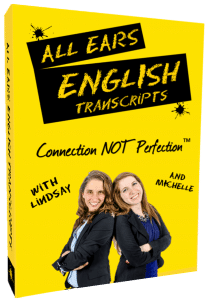
Have you ever struggled with understanding the differences between the words “whole” and “entire”?
Have you heard both of these used in English conversations?
If you have found yourself confused between the two, you are not alone.
Though it can be a bit tricky to understand the differences, we’re going to show you what they are.
Today you will understand what to focus on, and when each one may be more appropriate than another.
Get Your Transcripts Today!

Make sure you understand every word you hear on All Ears English.
Bring your English to the advanced level with new vocabulary and natural expressions.
Subscribe and get the transcripts delivered by email.
Learn to speak naturally with the American accent.
Click here to subscribe and save 50%
Today we have a question about the difference between the words entire and whole.
Hi girls!
I’ve been listening to your show every day for eight months, and I think it’s a life changing experience for me. Your episodes are really deep and insightful, and I love the way you convey positive energy through your voices!
I would really appreciate it if you could elaborate on the difference between the words “whole” and “entire.” For instance, if I’d like to say I had a sleepless night, I’m not sure which applies here. Should I say “I haven’t been sleeping for… “the whole night” or “the entire night”?
Thanks in advance,
Radmila
Understanding The Differences
If you start researching this, you will find that there’s a lot of conflicting information.
You will find that understanding the differences between “entire” and “whole” can be quite confusing, which is rather unnecessary.
We aren’t going to get into the grammar of it today, but we are just going to talk about usage in general.
In general, the words are ultimately the same or very similar in nature.
The difference may actually be more in the level of formality in which it is used.
You might see the word “entire” used in a more formal way.
So if you look at the example above or any situation like this, you may want to consider who you are talking to.
You may want to consider your personality or comfort level in this situation as well.
There may be some deeper reasons as to why you might use one over the other, but in general you may find that you use “whole” more in everyday conversations.
Looking At Examples Up Close
Look at the examples listed below so that you can get a true understanding here.
See how each one compares to the next, and it may be that one just fits better than the other.
- I watched the whole movie vs. I watched the entire movie.
- They came late so they missed the whole show vs. they came late so they missed the entire show.
- I can’t believe I ate a whole pizza all by myself vs. I can’t believe I ate an entire pizza all by myself.
The real focus of this is on the chunks.
There are some chunks/phrases/idioms that would most likely be used with whole, and some that fit better with entire.
Some of these you can figure out yourself just by sounding it out for yourself.
Others you may want to practice with to gain a true and thorough understanding.
Looking At Each Word Closely
When you have two words that are so close in their meaning, it can be hard to know which to use.
This is when you want to do a side-by-side comparison to see for yourself.
When in doubt, take the time to compare the two and see which one feels more natural.
These are times when one is definitely more appropriate than another, and here we look at some of the more obvious examples.
Whole
- On the whole: This is to say generally speaking. This is an instance where “whole” is part of the actual phrases and therefore is the natural choice. “On the whole, she’s a good worker. I think she should get the promotion.”
- The whole kit and caboodle: This means everything involved or that it includes every single thing. You are included everything in that particular situation, and so this phrase can stand alone. “I heard everything you said. The whole kit and caboodle!”
- The whole shebang: This is more a slang phrase, but it also means everything involved. It’s as if you are saying everything about that or everything included in that. “So that’s what we have to do. The whole shebang. It’s a lot but don’t worry. We’ll get it done!”
Entire
- That’s not entirely true: This common phrase means that there are flaws with something that is being said. There may be some facts, but the rest is not all true, and therefore must be reexamined or reconsidered. “I know you think I never come on time, but that’s not entirely true. Remember I was early last week.”
- In its entirety: This is to say everything, or the total of something. “I finished the work in its entirety. I’m going home.”
These are the instances where one word is definitely more effective and appropriate than the other.
If a phrase uses one word over another, then you don’t change it up and just keep it as it is.
A Roleplay To Help
Let’s take a look at a roleplay that may help you to differentiate which one may work better in English conversation.
In this situation, two co-workers are talking about a report we are completing.
L: So did you finish the section on marketing?
M: I did! I read the whole thing. You did a great job.
L: Thanks. I was working on it the entire night.
M: Yeah. I mean on the whole, there’s not much to change. Just a few minor things.
L: Ok let’s go over the report together in its entirety.
M: Yup- the whole kit and caboodle!
L: Yup!
Takeaway
Though it may be confusing at first, the basic idea is that these two English words are quite similar.
If we dissect them more, there could be more differences but that’s not the point here.
The point to focus on is the chunks/idioms and knowledge of which word to use depending on formality.
Keep this idea in mind when you encounter similar words.
Try using each one in English conversation, and you just might find that there isn’t a big difference at all.
If you have any questions, please place them below in the comments section.
We’ll get back to you as soon as we can.








